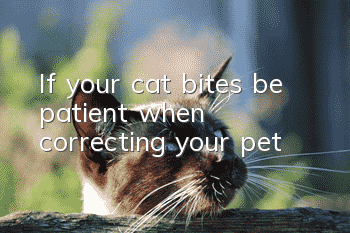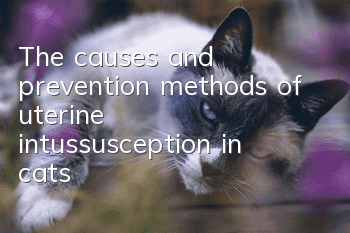If your cat bites, be patient when correcting your pet!

Pet cats will not attack people for no reason. If a cat attacks people, you cannot just punish them, but you must comprehensively analyze the reasons for this situation. Only by deeply understanding the cat's heart can we help the cat correct these behaviors.
1. Multi-faceted analysis of cat attacks
1. Fear-induced aggression
Most cats tend to run away from danger (real and imagined), but if they are cornered or otherwise have nowhere to escape, they will choose to attack. Even shy or timid cats will attack if there is no way to escape.
2. Imagining threats and counterattack
Sometimes, the reason is not obvious. A timid cat may be afraid of various imagined threats, such as sudden noises or movement. In addition, your cat may have experienced something in the past that caused it to be hurt, making it especially afraid of certain things or phenomena that we don't pay special attention to.
3. Retaliation and deflection attack
Regardless of the original motivation, if cats cannot resist the source of the attack through revenge, they will transfer their emotions to the nearest person or other animal (domestic dog, other cat, etc.).
4. Limit attacks at home
Suppose the cat is sitting in front of a window and suddenly discovers a dog or another cat. The cat begins to act agitated, but being confined indoors prevents it from reacting in any way to the perceived danger. When it happens to pass by, pet its cat. head. You can't blame the cat for suddenly attacking you or attacking you.
All the pent-up aggressive emotions are released on what you think is an unprovoked attack.
5. Pain leads to scratching and biting
For humans, this is perhaps the easiest type of attack to understand. The poor kitten is in pain, so, naturally, it gets agitated and tries to attack everyone around it. It's just an instinctive act of self-defense to protect yourself from harm.
Cats’ skin is very sensitive, and we may be causing them pain without even realizing it.
6. If you caress, you will be bitten
This type of attack is most familiar to cat owners. Your cat lies peacefully next to you, begging for your caress, and you begin to stroke it gently. The cat purred with satisfaction, but within a few minutes, the purring began to slowly stop, and suddenly the cat turned around and took a bite.
7. Disease triggers attack
For any sudden onset and gradual increase in unprovoked violence, you should first consult your veterinarian to see if there is a medical cause. Any changes in its behavior should be noted and considered as part of the cat's routine and health assessment.
two,How to train cats not to attack
1. Use your voice to stop it
When a cat pounces on your hands and feet, the fastest way to stop it is to stop it with a serious expression and use a simple word, such as "no" or "no", which will be easier for the cat to remember.
2. Use actions to stop it
Just like a mother cat does to a kitten, pinch the fur on the back of its neck and gently push it down to the ground, and maintain this state for a few to ten seconds, hinting to the kitten that you are its mother and have absolute control over it. Leadership, give it this memory repeatedly and it won't attack you again.
However, this method is more suitable for kittens, not for independent adult cats.
3. Attract it with toys
When the cat pounces on you, you can take out the prepared toys, such as cat teasing sticks, leather mice and other gadgets, and teach it to play with toys instead of your hands. Playing with toys is an interaction between parents and cats, which can greatly enhance the relationship between cats and their owners, and can also cultivate the cat's hunting and movement abilities.
4. Don’t be stingy with praise
The power of praise is always greater than criticism. Cats are very sensitive to human emotional changes. A good atmosphere and happy mood can encourage the cat when it is praised. When the cat does well, be sure to smile and pet it and praise it kindly and gently. It will continue to do better in the future.
5. Hug ten points every day
Cats, like children, need companionship. If you often give your cat a feeling of love, the cat's aggressive behavior will decrease a lot. After all, pets living in care and attention are generally relatively docile and often caressed by their owners. Cats that behave interactively can express their emotions correctly and will not attack for no reason.
- A little belly? Sagging flesh? Is the cat obese?
- How to train a cat that is too naughty? How to train a cat to be obedient and well-behaved!
- How to treat diabetes in cats?
- What to do if the kitten is disobedient. Start training the cat to be obedient from an early age.
- What to do if a male cat in heat urinates everywhere
- What causes yellow urine in cats
- Can I deworm my cat again if there are still fleas after deworming?
- What common genetic diseases in cats do you know?
- What should I do if my cat with folded ears has diarrhea? What are the causes of diarrhea in folded-eared cats?
- Reasons why cats grind their claws and how to train cats to grind their claws in a fixed place



